The Next Page
Are you curious about the power of international cooperation? And how it affects our future? Tune in to the #NextPagePod, the podcast of the UN Library & Archives Geneva, designed to advance the conversation on multilateralism.
Are you curious about the power of international cooperation? And how it affects our future? Tune in to the #NextPagePod, the podcast of the UN Library & Archives Geneva, designed to advance the conversation on multilateralism.
Episodes
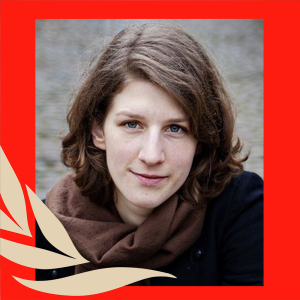
Friday Apr 16, 2021
Friday Apr 16, 2021
In this episode, historian, author and researcher Katharina Rietzler joins Francesco Pisano to talk about her new book called Women's International Thought: A new history. Dr Rietzler co-wrote the book after her research revealed that numerous women in history have researched and published in the field of international public affairs but only a few were present in the documented history of international relations as a disciple and in international thought.
Although the author pays tribute to otherwise marginalised female thinkers in the book, she also stressed the importance of not predetermining, romanticising and generalising women’s intersectional contributions purely on their gender.
Tune in to hear this intriguing discussion about rethinking the patriarchal history of international relations by challenging existing paradigms through the recovery of female voices.
Resources
Dr. Katharina Rietzler - Profile: https://bit.ly/3s9YGfc
Follow Katharina Rietzler on Twitter: https://twitter.com/kathistory
Women's International Thought: A New History: (book) https://bit.ly/3dNPXKc
Read the book through UN Library Geneva
The Leverhulme Project on Women’s Thought: https://bit.ly/3wQRzf7
The Leverhulme project publication: https://whit.web.ox.ac.uk/home#/
Transcript
Available here
Content
Speaker: Katharina Rietzler & Francesco Pisano
Host: Natalie Alexander
Producer/Editor: Katrine Lyngsø
Image: Fran Monks
Social media designs: Katrine Lyngsø
Recorded & produced at the United Nations Library & Archives Geneva
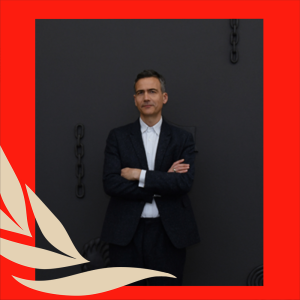
Monday Apr 12, 2021
Monday Apr 12, 2021
In this brief excerpt of Episode 48 – originally recorded in French – Kelly Le Normand speaks with Andrea Bellini.
Director of the Centre d’Art Contemporain Genève, artistic director of the Biennale of Moving Images, curator and contemporary art critic, Andrea Bellini shares his experience of international Geneva and offers us a unique perspective on multilateralism. His exhibitions and publications address major current themes – racial question, feminism, gender identity – and invite intercultural dialogue. He describes art as an indispensable tool for a better understanding of the world and a sharing of universal values.
Resources
Centre d’Art Contemporain Genève: https://centre.ch
Digital platform of the Centre: https://5e.centre.ch/en/
UNOG Art collection: https://bit.ly/3d0F9rS
MIRE Project: https://fcac.ch/commande-publique/projet-mire/
Transcript
Available here
Content
Speakers: Andrea Bellini
Host/Editor: Kelly Le Normand
Producers: Karen Lee & Natalie Alexander
Image: Mathilde Agius
Social media designs: Natalie Alexander
Recorded & produced at the United Nations Library & Archives Geneva
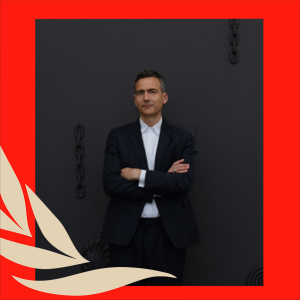
Monday Mar 29, 2021
Monday Mar 29, 2021
Dans ce nouvel épisode de The Next Page, Kelly Le Normand accueille Andrea Bellini.
Directeur du Centre d’Art Contemporain Genève, directeur artistique de la Biennale de l’Image en mouvement, curateur et critique d’art contemporain, Andrea Bellini partage son expérience de la Genève internationale et nous propose un point de vue inédit sur le multilatéralisme. Ses expositions et publications abordent les grandes thématiques actuelles – question raciale, féminisme, identité sexuelle – et invitent au dialogue interculturel. Il décrit l’art comme un outil indispensable à une meilleure compréhension du monde et à un partage de valeurs universelles.
Ressources
Centre d’Art Contemporain Genève : https://centre.ch
Plateforme digitale du Centre : https://5e.centre.ch/fr/
Collection d’œuvres d’art de l’ONUG : https://bit.ly/3d0F9rS
Projet MIRE : https://fcac.ch/commande-publique/projet-mire/
Transcription: https://libraryresources.unog.ch/c.php?g=673332&p=4880979&t=18232
Contenu
Intervenant: Andrea Bellini
Animatrice: Kelly Le Normand
Réalisation et montage: Karen Lee, Natalie Alexander & Kelly Le Normand
Image: Mathilde Agius
Enregistré et produit à la Bibliothèque des Nations Unies à Genève
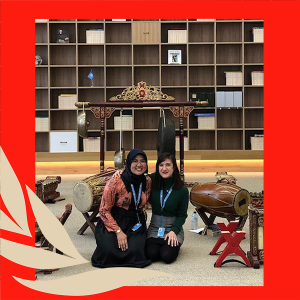
Friday Mar 19, 2021
Friday Mar 19, 2021
In episode 47, Dira Fabrian joins our Knowledge Rising series to reflect on the role of young diplomats in multilateralism today. After a decade serving as a diplomat for her home country of Indonesia, she shares what she's learned in these past years, as well as her advice for young diplomats entering the service in a rapidly changing global and technological landscape. She also shares what she believes is important to make multilateralism more inclusive, and what it takes to find common ground while embracing our diversity.
Resources
The Women's Power Index, by the Women and Foreign Policy Program at the Council on Foreign Relations: https://www.cfr.org/article/womens-power-index
UN-Women - Facts and Figures: Leadership and Political Participation: https://www.unwomen.org/en/what-we-do/leadership-and-political-participation/facts-and-figures
Watch the Gamelan being played at the UN Library & Archives Geneva: https://fb.watch/4gxLE-pPEE/
Find out more about the Gamelan: https://www.thoughtco.com/history-of-gamelan-195131 TranscriptAvailable here: https://libraryresources.unog.ch/audio/dirafabrian
Content
Speaker: Dira Fabrian
Host: Natalie Alexander
Editor/Producer: Karen Lee & Natalie Alexander
Images: Dira Fabrian
Graphics, social media designs and transcript: Natalie Alexander
Recorded & produced by the UN Library & Archives Geneva

Friday Mar 05, 2021
Friday Mar 05, 2021
Episode 46 sees Professor Carlos Lopes return to the podcast after featuring in our very first episode back in 2019. This time, he joins us online from South Africa, to speak with our Director Francesco Pisano about his latest book: Structural Change in Africa: Misperceptions, New Narratives and Development in the 21st Century, which he authored with George Kararach.
Professor Lopes is a Professor at the Mandela School of Public Governance at the University of Cape Town, a Visiting Professor at Sciences Po, an Associate Fellow in the Africa Programme at Chatham House, and the former Executive Director of the United Nations Economic Commission for Africa, among other roles. He joins Francesco Pisano to speak about the importance of this new work, and what is necessary for Africans to change their reality through structural transformation. The book's 7 chapters aim to expand our knowledge about the African continent, and outline practical suggestions for how development in this complex, yet vibrant continent can be achieved.
Resources
Find out more about the book Structural Change in Africa: Misperceptions, New Narratives and Development in the 21st Century, which is co-authored by Carlos Lopes and George Kararach.
Professor Carlos Lopes joined us on the podcast in 2019, to discuss his book "Africa in Transformation: Economic Development in the Age of Doubt". Listen here: https://unitednationslibrarygeneva.podbean.com/e/episode-1-library-talk-african-in-transformation-with-carlos-lopes/.
To keep learning, follow Carlos Lopes on Twitter: https://twitter.com/LopesInsights
See the episode transcript here: https://bit.ly/3bZoC6T
Content
Speakers: Carlos Lopes & Francesco Pisano.
Host: Karen Lee & Natalie Alexander.
Editor & Sound Editor: Karen Lee.
Images: Carlos Lopes.
Recorded and produced at the UN Library & Archives Geneva.
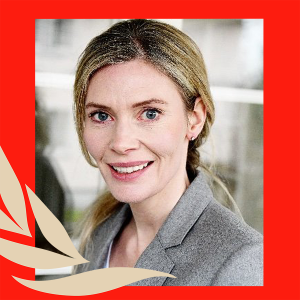
Friday Feb 19, 2021
Dr. Filippa Lentzos on biological threats in the 21st century
Friday Feb 19, 2021
Friday Feb 19, 2021
Last year, 2020, marked the 45th anniversary of the Biological Weapons Convention that was negotiated at the Palais des Nations in Geneva. It was the first multilateral disarmament treaty banning an entire category of weapons of mass destruction. It prohibits the development, production, acquisition, transfer, stockpiling and use of biological and toxin weapons. Last year also saw the outbreak of a major pandemic that humanity is grappling to bring under control.
In episode 45, we meet with Dr. Filippa Lentzos, who holds a joint appointment as Senior Research Fellow at the Department of War Studies and the Department of Global Health & Social Medicine at King’s College London, and who is also a regular participant as NGO Coordinator at meetings of the Biological Weapons Convention in Geneva. Dr. Lentzos explains more about her work and her book Biological Threats in the 21st Century, sharing her thoughts on multilateralism for security in this field, providing insights on how to prepare for and respond to outbreaks of disease, and giving us glimpses of emerging technologies. Underlying the conversation is the theme of the importance of moral frameworks.
Resources
Learn more about Dr. Lentzos and her work: http://www.filippalentzos.com/
Biological Threats in the 21st Century (Book): https://bit.ly/3uhhiw2
United Nations Biological Weapons Convention: https://www.un.org/disarmament/biological-weapons
Access the episode transcript here: https://bit.ly/3qtdsxn
Content
Speakers: Dr. Filippa Lentzos and Amy Smith
Host: Amy Smith & Karen Lee
Editor/Producer: Karen Lee
Images: Dr. Filippa Lentzos
Graphics, social media designs and transcript: Karen Lee
Recorded & produced by the UN Library & Archives Geneva
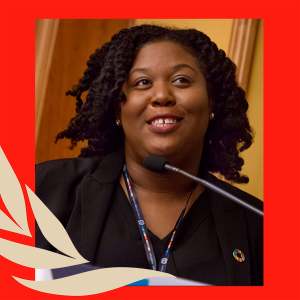
Friday Feb 05, 2021
Kris Monteith on activating youth voice #KnowledgeRising
Friday Feb 05, 2021
Friday Feb 05, 2021
Today, we continue with our series Knowledge Rising dedicated to listening to young changemakers. In episode 44, we are joined by Kristeena Monteith.
Kris is the creative producer at Talk Up Yout, a suite of multi-media platforms, and executive producer of Talk Up Radio that gives Jamaican Youth a voice and focuses on tackling issues affecting young people. It’s also led, produced and driven by young people and after almost a decade of existence the platform is firmly identified with youth upliftment and empowerment. Not surprisingly, with her dynamism and as a leading activist, Kris was also chosen to be a class of 2018 UN Young Leader for the Sustainable Development Goals.
As a young person herself, Kris speaks on the importance and necessity of activating youth voice and shares the many ways she is using the Talk Up Yout platform to not only encourage young people to speak, but others to listen.
Resources
Access the episode transcript here: https://bit.ly/3qb7XCR
Learn more about Kris and her work: https://www.kristeenamonteith.com/
Learn more about Talk Up Yout and Talk Up Radio: https://www.talkupyout.com/
Twitter: https://twitter.com/TalkUpYout
Instagram: https://www.instagram.com/talkupyout/
YouTube: https://www.youtube.com/user/talkupyout
A special mention to Talk Up Radio’s other superstar co-producer, Andrica Rigg!
Youth and Organizations Mentioned
Kevaughn Ellis - Inner-city Development Youth Association (IDYA): https://www.instagram.com/innercitydya/
Chelsea Wright - Girls Who Know: https://www.instagram.com/girlswhoknowja/
Dainalyn Swaby - Global Yaadie: https://www.instagram.com/globalyaadie/
Najeeb "Jeeby Lyricist" Spence: https://www.youtube.com/watch?v=o2TarEMxFfk
Not mentioned:
Isheba Cornwall - Empower Youth Tees: https://www.instagram.com/empower_youth_tees/
Content
Speakers: Kris Monteith and Natalie Alexander
Host: Amy Smith
Editor/Producer: Karen Lee
Images: Kris Monteith
Graphics, social media designs and transcript: Karen Lee
Recorded & produced by the UN Library & Archives Geneva
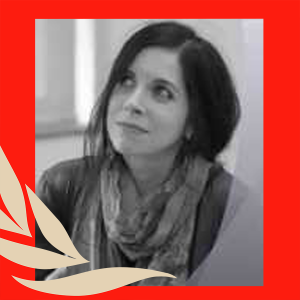
Tuesday Jan 26, 2021
Dr. Hope Elizabeth May on Bertha von Suttner and the power of positive history
Tuesday Jan 26, 2021
Tuesday Jan 26, 2021
This episode introduces a key figure in the 19th century peace movement: the Austrian writer, activist and Nobel Peace Prize laureate Bertha von Suttner. Who was she, what did she work towards, and how does her contribution connect to our present day? Dr. Hope Elizabeth May, Professor of Philosophy and the Director of the Center for International Ethics at Central Michigan University, joins The Next Page to share more about Bertha and her current research as part of the Bertha von Suttner project.
This episode is a companion to the event held on 26 January 2021 at the UN Library and Archives Geneva, Bertha von Suttner: A Woman Ahead of Her Time, where Dr. May and Colin Wells (Project Manager of the Total Digital Access to the League of Nations Archives), explore her role as an activist and political thinker, her influence on the establishment of the first multilateral institutions, and her action in favor of international peace.
In spite of her achievements, unthinkable for a woman of her time, many do not know about her work and life. This episode, as well as the online event, are designed as an introduction to her work and ideas. We hope you enjoy!
Resources:
Episode Transcript: https://bit.ly/39hdKkZ
To watch the replay of the online event, visit: https://bit.ly/2JZ1prQ
Explore resources about Bertha and the peace movement at the Library & Archives in this Research Guide on Bertha von Suttner: https://libraryresources.unog.ch/vonsuttner
Learn more about the Bertha von Suttner Project: https://www.berthavonsuttner.com/
Content
Speaker: Dr. Hope Elizabeth May
Host/Editor: Natalie Alexander
Producer: Natalie Alexander
Images: Dr. Hope Elizabeth May
Social media designs and transcript: Karen Lee & Natalie Alexander
Recorded & produced at the United Nations Library & Archives Geneva
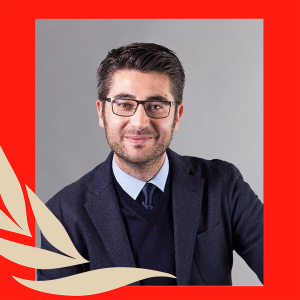
Friday Jan 22, 2021
Dr. Gabriele Balbi on Techno-diplomacy and Global Communications
Friday Jan 22, 2021
Friday Jan 22, 2021
Technology has always been an integral part of our lives and our work, but the COVID-19 pandemic has highlighted its role in many new ways. In episode 42, we are joined by Gabriele Balbi, Associate Professor in Media Studies at USI Università della Svizzera italiana. As an expert in media history, his work and research are also greatly connected with the International Telecommunications Union (ITU), a specialized agency of the UN system.
In this conversation, Professor Balbi speaks on the rich evolution and growth of global communications, looking at its history from the telegram to the Internet. He also defines the concept of techno-diplomacy, and further explains its role in multilateral collaboration and conversation.
As we face rapid digitization and a "new normal", Professor Balbi also touches upon the new challenge of Zoom fatigue, and the need to balance our digital and physical worlds.
We hope this episode brings you new insights and perspectives, not only to our present but equally to our past!
About Professor Gabriele Balbi
Learn more here: https://bit.ly/2XNe3xc
Prof. Gabriele Balbi is Associate Professor in Media Studies at the Institute of Media and Journalism (IMeG), Faculty of Communication, Culture and Society, USI Università della Svizzera italiana (Switzerland).
At this institution, he is also program director of the Bachelor in Communication, director of the China Media Observatory, vice director of the Institute of Media and Journalism. Furthermore, he is Chair of ECREA Communication History Section and International Liaisons Representative of the ICA Communication History Division.
Prof. Balbi's research is focused on media studies with a historical and long-term perspective. His research is at the crossroads of media studies, the history of technology, media archaeology, Science and Technology Studies, the political economy of communication, and cultural studies.
About the ITU
ITU History Portal: https://bit.ly/3irH1Mv
ITU's First 150 Years: https://bit.ly/3ioQep7
ITU Connect 2030 Agenda: https://bit.ly/39QOiSu
Resources
Episode transcript: https://bit.ly/3nSrPct
History of the International Telecommunications Union: Transnational Techno-Diplomacy from the Telegraph to the Internet (Book): https://bit.ly/39XCXA7
Content
Speakers: Professor Gabriele Balbi & Karen Lee
Host/Editor: Karen Lee & Natalie Alexander
Producer: Karen Lee
Images: Gabriele Balbi
Social media designs and transcript: Karen Lee
Recorded & produced at the United Nations Library & Archives Geneva
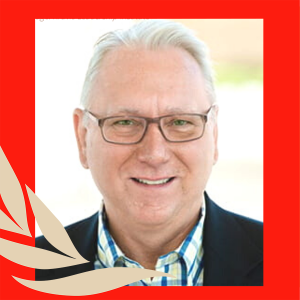
Friday Jan 08, 2021
Dr. David Day on Learning to be a Leader
Friday Jan 08, 2021
Friday Jan 08, 2021
Happy New Year to all of our listeners.
In Episode 41, our Director Francesco Pisano speaks with Dr. David Day, Professor of Psychology at Claremont McKenna College and Academic Director of the Kravis Leadership Institute.
Are leaders born or made? What defines a leader, and how is the concept of leadership evolving as we question the type of leaders we need to meet our global challenges? As we make our way through the COVID-19 pandemic, what can we learn about being a leader? Dr. David Day, a leadership specialist, speaks on the need for three-dimensional leaders, the difference between leader development and leadership development, and looks to the future and what the next generation of leaders might look like.
In a time where creative, collaborative, and courageous leadership is essential, Dr. David Day encourages us all to be leaders – in any capacity in which we serve.
About Dr. David Day
David Day, Ph.D. is a Professor of Psychology at Claremont McKenna College and Academic Director of the Kravis Leadership Institute, Steven L. Eggert ‘82 P'15 Professor of Leadership and George R. Roberts Fellow. Previously he was Professor of Organisational Behaviour and Woodside Chair in Leadership and Management at The University of Western Australia Business School.
Resources
Kravis Leadership Institute: https://www.kravisleadershipinstitute.org/
Episode Transcript: https://bit.ly/2KKytnh
Content
Speakers: Dr. David Day & Francesco Pisano
Host/Editor: Natalie Alexander & Karen Lee
Producer: Karen Lee
Images: The Kravis Leadership Institute
Social media designs and transcript: Karen Lee
Recorded & produced at the United Nations Library & Archives Geneva

The #NextPagePod
Are you curious about the power of international cooperation? And how it affects our future? Then tune in to the #NextPagePod, the podcast designed to advance the conversation on multilateralism!
Each episode delves into global issues through a multilateral lens, exploring how collaboration across disciplines can facilitate reaching common goals.
Produced at the United Nations Library & Archives Geneva
Editorial Team:
Editor & Coordinator - Amy Smith
Hosts: Francesco Pisano, Natalie Alexander, Amy Smith, Blandine Blukacz-Louisfert, Hermine Diebolt.
Podcast logo and designs - Natalie Alexander, Amy Smith.





